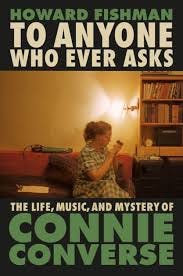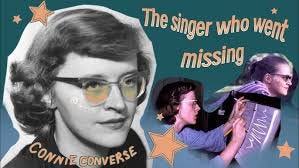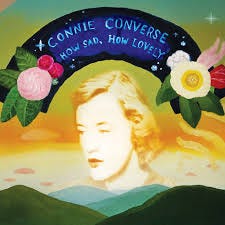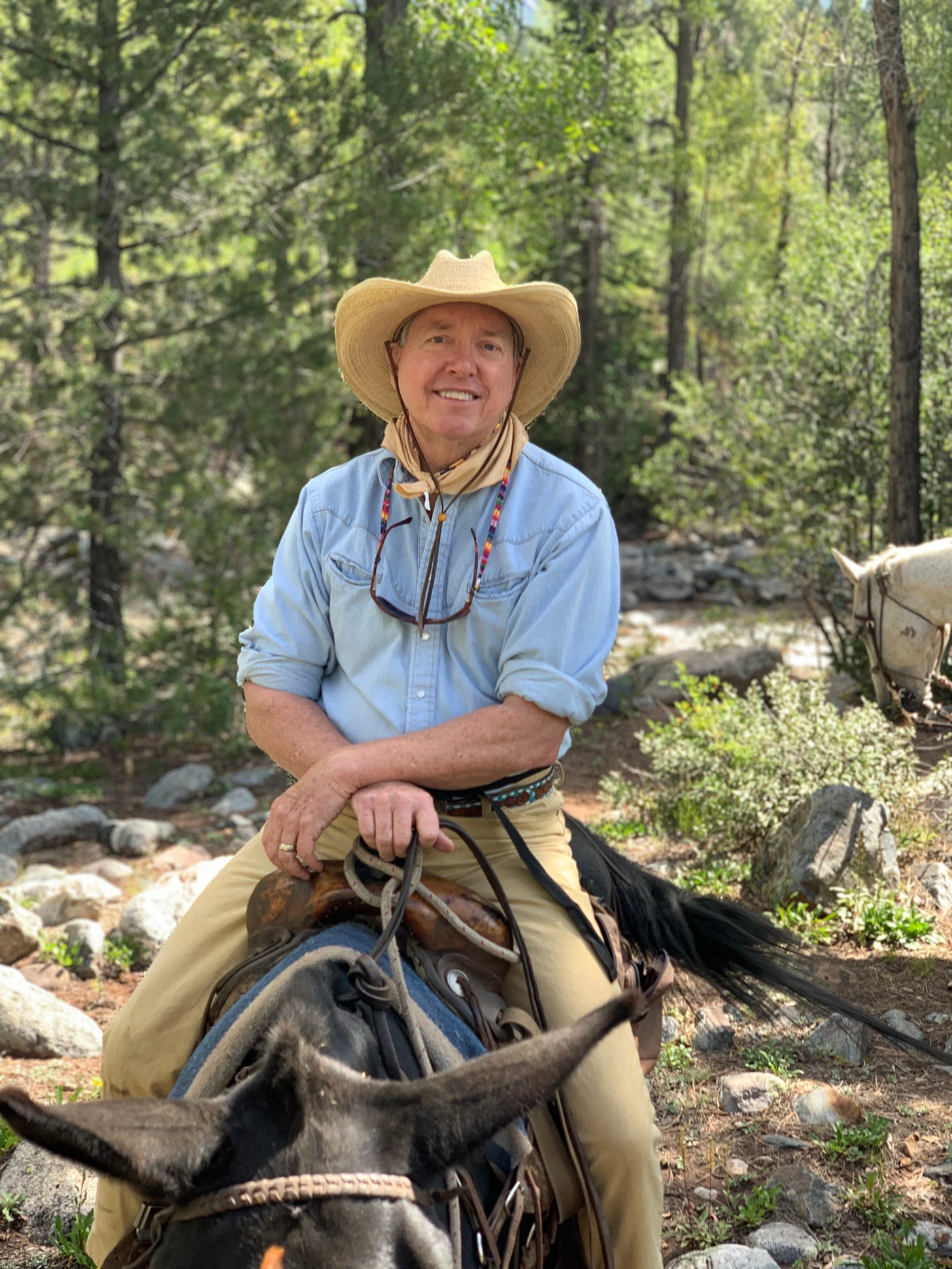TO ANYONE WHO EVER ASKS: The Life, Music and Mystery of Connie Converse. By Howard Fishman
First, a hearty welcome to the many new followers who found this letter over the last few weeks. Word continues to seep out!
________________________________________________
IF I could shout from a soapbox or pound the table with a recommendation, I'm doing that right now! TO ANYONE WHO EVER ASKS is the true story of Connie Converse, a singer and composer whose truly beautiful and haunting music never reached an audience during her troubled lifetime; she dabbled through life, then one day drove off in her Volkswagen Beetle and was never seen again.
99% of you never heard of Connie Converse or her music. It must be a tricky thing to write a biography about a person nobody’s ever heard of, but that’s exactly what author Howard Fishman has done. He's wildly successful. Either posthumously, or in her absentia, Fishman has made Connie Converse a cult hero. She’s quite possibly one of the best folk singers and composers the world never knew; but now, her spectacular work has been recovered and refreshed by this book. Here’s a biography wrapped around a mystery; further, it offers a road map of the musical awakening of Greenwich Village in New York City during the 1950s.
A party in 2011 changed Howard Fishman's life. There he heard a scratchy recording of a soulful woman singing and strumming a guitar. As a musician himself, he had to know more, was gripped by the mystery, and took a deep dive into the world and music of Connie Converse. After 13 years of painstaking research, the life of an utterly unknown artist has been brought to light.
Connie Converse was a mostly typical young woman growing up in New England. Well educated, she attended Mt. Holyoke College. She declined various professional opportunities that appealed to her classmates and moved instead to Greenwich Village in New York. It was during World War II. She took random day jobs and composed music in her apartment after hours. She was independent, almost rebellious at times, long before the social upheavals of the 60s. Over the next several years she sang and played privately for a few close friends and family, after dinners and late at night, in people’s living rooms. By all accounts, everyone who listened was amazed by this talent who did her own thing, before the influence of Bob Dylan, Joni Mitchell, or Woody Guthrie. She wrote precise lyrics and tight guitar chords, and sang with her own unique voice. While she was applauded and encouraged by all who heard her, she never made commercial inroads. Along the way, someone made a few living room recordings on an old- fashioned reel-to-reel tape recorder. (And that’s all we have today.) She never hit the clubs, let alone a recording studio.
Years passed and Connie moved to Minnesota and became involved in the anti-war movement and causes that combated racism. She remained single with few close relationships, although by all accounts she was not unpopular. She lived in spare bedrooms with friends and cheap apartments. She continued to correspond with family back in New England and New York, made a few trips to visit. Time wore on and she continued to write songs; but as she approached 50 years old she had constant money problems, drank, borrowed money, suffered depression. Then in August 1974, she drove off in her Volkswagen Beetle one day, never to be seen again.
The recording at the party in 2011 that Howard Fishman heard was a version of that reel-to-reel tape. He was fascinated. Not only was Fishman a seasoned writer (He’s a regular contributor to The New Yorker, Vanity Fair, etc.) he’s an accomplished musician himself, entirely capable of describing Converse’s talents and abilities, analyzing her lyrics, melodies, the musical fine points. He's careful not to overwhelm us with technicalities, but he does speak to her eloquence, and holds her as a predecessor or contemporary of early folk singers like Woody Guthrie and Pete Seeger. On the musical chain, her link comes before Guthrie and Seeger, as well as Bob Dylan, Joni Mitchell, Judy Collins, Joan Baez, and even Elvis.

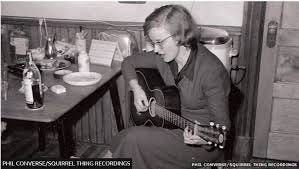
So long before pop and rock, Connie Converse was writing Dylanesque songs before Dylan himself. Her catalog is on Apple, Spotify and other platforms. I was eager to listen. I played 30 or 35 of her songs, listened three times, trying to place myself back into the musical picture of the 1950s. You hear very pure tracks from those living room recordings in the Village from the 1950s. They’re underproduced, non-professional, clean. And I have to say, I'm a fan. Her music is listenable, thoughtful, subtle, and complex. Incredibly endearing. It's not amplified or arranged -- it's just the voice of a simple soul, strumming carefully, singing from her heart. One might only imagine how it’d sound if a producer had ever stepped in, put her in a recording studio, with professional support. Instead, Connie Converse was an outsider who never felt the embrace of the musical mainstream, in fact she never even held its hand.
While I've skipped most of the finer biographical details, Fishman does not. His research is profound, gathered from long-lost friends and family, many with only fleeting memories of Connie. But 13 years of research speaks for itself, and the result is an incredibly detailed portrait of an amazing woman's life. Not much good luck ever came her way. Was that self-imposed? You can reach your own conclusion. In any case we have a portrait of a complicated and groundbreaking artist who seemed to be confronted with that time honored artistic conflict: how can one achieve notoriety, but remain anonymous at the same time.
Connie Converse’s music is slowly creeping out there. Her songs are interesting, carefully constructed, soulful. Are they ballads? Folk songs? Light pop? Many are truly catchy. Most of all, I was captured by the lyrics, so carefully written, each word so precise and well chosen. Converse wrote gifted ‘musical poetry’, which she fashioned in her own style. She has her own unique sound and certainly sits on her own branch of the musical tree. Which all begs the question, did the world fail Connie Converse? Did she under promote herself? Was she too shy? Victim of bad luck? No matter your conclusion, she’s very deserving to be heard.
The book ends with the author offering a few theories on her mysterious disappearance. She literally drives off into the sunset. This is the kicker on an amazing story. He speculates, but allows the reader to draw their own conclusions.
You read TO ANYONE WHO EVER ASKS to learn the wonderful story of someone whose star never shone like it should have. You read it because it’s a first-rate biography; it’s also a fine mystery. You read it also because it offers a narrative of music in the Village in the 50s and ewarly 60s, an important time as folk music emerged, influencial musicians blossomed, and rock followed.
But to me, there's a far more important story here: the book reaches past Connie Converse. This book is an appreciation and tribute to all artists who toil in obscurity their entire lives. There are literally millions of Connie Converses out there -- composers, musicians, singers, writers, painters, poets, knitters and needle-pointers, dancers, woodworkers, and cooks! Anyone with a creative sentiment or talent, and a dream… All of those looking for that One Big Break! Don’t all ‘struggling artists’ think, if only a few things had been different? In any case, this biography of Connie Converse speaks to all the living-room artists who create beautiful expressions, yet remain in the shadows, if not total darkness. TO ANYONE WHO EVER ASKS underscores the struggles and pain of an artistic life, its emotional wear and tear, the challenges and often the sadness. That’s why this is an important book, and why it reaches way past Connie Converse.
Try this fascinating book. Here's the link on Amazon.
_________________________________________________________________________
As always thank you for reading and sharing.
I'm a novelist in Arizona, currently working on my 8th book. I blend humor, pop culture, outsiders who find themselves up against it, and different sides of human kindness. Two of my novels reached Number One on various categories of Amazon. Find out more about all my work at MIKE'S BOOKS.
MD in AZ


